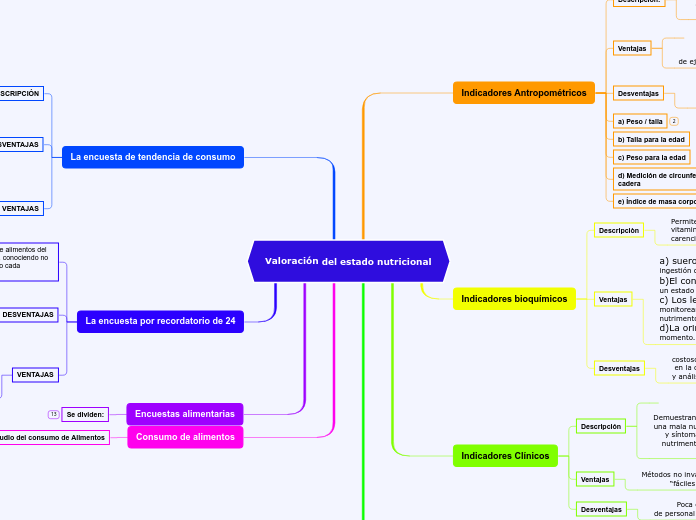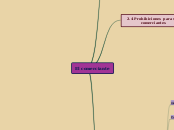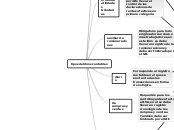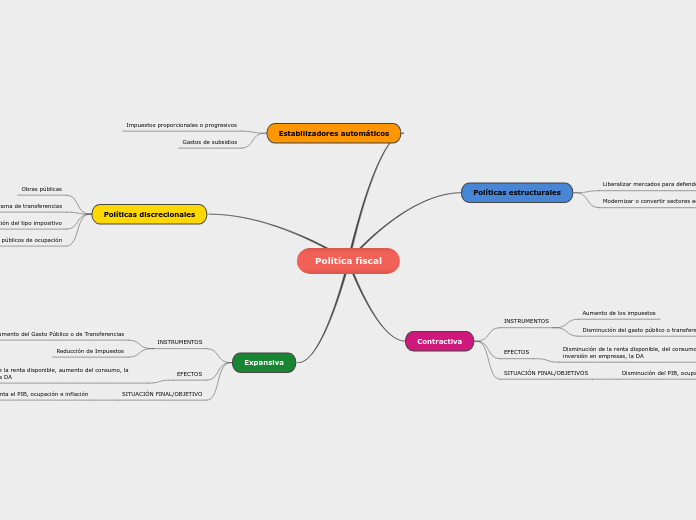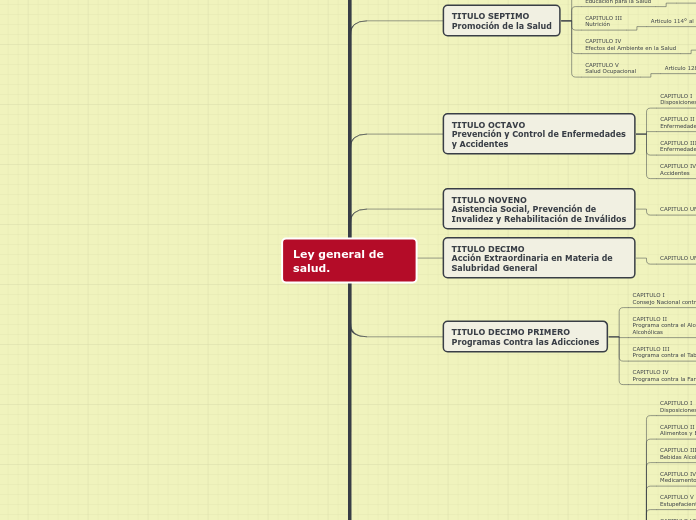Valoración del estado nutricional
The part of speech is a category to which a word is assigned according to its syntactic functions. In English the main parts of speech are noun, pronoun, adjective, determiner, verb, adverb, preposition, conjunction, and interjection.
Consumo de alimentos
A conjunction is a word like 'if' 'but' or 'and' which is used to connect sentences or clauses together.
El estudio del consumo de Alimentos
Subordinating conjunctions are conjunctions that are used at the beginning of subordinate clauses. Some examples of these conjunctions are: although, after, before, because, how, if, once, since, so that, until, unless, when etc.
El cálculo de diferentes índices de calidad permite tener una idea global del estado de nutrición, evaluado a
través de la dieta.
VENTAJAS:Identificar la relación que existe entre la alimentación y el desarrollo de enfermedades.
DESCRIPCIÓN: La cantidad y el tipo de alimentos consumidos proporciona importantes antecedentes que pueden relacionarse con el desarrollo,prevención y tratamiento de diversas enfermedades.
Encuestas alimentarias
A preposition is one of the most exciting parts of grammar. A preposition is used to describe the location of something in relation to something else.
Se dividen:
When a preposition consists of one word it is called single or simple preposition.
Encuestas alimentarias por registro
Estas se realizan pesando todos los alimentos
que una persona consume y luego pesando los restos que
dejaron.
DESVENTAJAS:Puede ser muy
invasivo, lo que puede modificar la forma de alimentarse de la persona, e inducirla a cambiar su ingesta.
VENTAJAS:Las cantidades de alimentos son exactas y el registro de varios días permite evaluar la ingesta habitual de la persona.
Encuestas Alimentarias por interrogatorio
DESCRIPCION:Consta en registrar todos los alimentos que son consumidos en un día,
El registro en diferentes días a través del año, nos
da una idea del patrón de consumo de alimentos de una persona y de las variaciones temporales, además de que la omisión de alimentos es mínima.
Se dividen en 2 grupos: Encuestas alimentarias por registro y las encuestas alimentarias por interrogatorio.
Subtopic
La encuesta por recordatorio de 24
An interjection is used to express emotion in a sentence.
Think of other interjections!
Es rápida de realizar se basa
únicamente en la memoria, no se modifican los patrones
alimentarios del entrevistado y el encuestado no necesita saber leer ni escribir.
Del método son que tiende a
subvalorar la ingesta de alimentos, se necesitan varios días
para obtener datos confiables, requiere de entrevistadores expertos y es difícil calcular el tamaño de las porciones.
DESCRIPCION:Conocer el consumo de alimentos del día anterior de la persona entrevistada, conociendo no sólo las preparaciones consumidas sino cada ingrediente que la compone.
La encuesta de tendencia de consumo
An adverb is used to describe a verb, but it can also describe an adjective or another adverb.
Adverbs normally help paint a fuller picture by describing how something happens.
VENTAJAS
Proporciona datos sobre la
ingesta habitual de alimentos, permite estudiar la relación entre dieta y enfermedad, no se modifican los patrones alimentarios de los entrevistados y el encuestado no necesita saber leer ni escribir.
DESVENTAJAS
Tiende a subestimar la ingesta; se basa en la
memoria en una importante medida; cuando se incluye un gran número de alimentos, las respuestas tienden a volverse rutinarias; requiere de entrevistadores expertos y es difícil calcular el tamaño de las porciones.
DESCRIPCIÓN
Se anota la frecuencia de consumo de alimentos (diaria,semanal, mensual, etcétera) referida al último mes,
Topic principal
Indicadores Clínicos
An article is a word used to modify a noun, which is a person, place, object, or idea. Technically, an article is an adjective, which is any word that modifies a noun.
Poca especificidad, requieren
de personal capacitado y con experiencia.
Indefinite articles are the words 'a' and 'an.' Each of these articles is used to refer to a noun, but the noun being referred to is not a specific person, place, object, or idea. It can be any noun from a group of nouns.
Métodos no invasivos, accesibles y
“fáciles de realizar”.
Descripción
It refers directly to a specific noun or groups of nouns.
Demuestran los cambios físicos que responden a una mala nutrición, y permiten identificar signos y síntomas de las deficiencias o exceso de nutrimentos y aquellos relacionados con una
enfermedad.
Indicadores bioquímicos
A noun is defined as a person, place, thing or idea. Proper nouns always begin with a capital letter. Common nouns, which are general words, such as 'cars,' are not capitalized.
A noun which refers to a group of things/people.
costosos,requieren de alta precisión
en la obtención de la muestra, almacenamiento y análisis, es un método invasivo.
Countable nouns are nouns that can be counted, even if the number might be extraordinarily high.
Uncountable nouns are nouns that come in a state or quantity which is impossible to count; liquids are uncountable, as are things which act
like liquids.
a) suero/plasma:su concentración refleja la ingestión dietética reciente b)El contenido de un nutrimento refleja un estado crónico del mismo (eritrocitos) c) Los leucocitos: se utilizan para
monitorear cambios cortos del estado del nutrimento d)La orina refleja la condición nutricional del momento.
Descripciòn
Proper nouns are the names of specific people or places. They should always begin with a capital letter.
Permiten medir el nivel hemático (sanguíneo) de
vitaminas, minerales y proteínas e identificar la carencia específica de éstos.
Indicadores Antropométricos
A verb is an action word or 'doing' word that signifies movement in some way.
e) Índice de masa corporal
d) Medición de circunferencia de cintura-
cadera
c) Peso para la edad
b) Talla para la edad
An auxiliary verb helps the main (full) verb and is also called a 'helping verb.' With auxiliary verbs, you can write sentences in different tenses, moods, or voices.
a) Peso / talla
A participle is a verb form that can be used as an adjective or to create a verb tense. There are two types of participles: Present participle (ending -ing) and Past participle (usually ending -ed, -d, -t, -en, or -n).
Create sentences
The winning athlete gets a trophy.
Desventajas
A modal is a type of auxiliary (helping) verb that is used to express: ability, possibility, permission or obligation. The main modal verbs in the English language are: can, could, may, might, must, shall, should, will, would.
Requieren de personal
capacitado, su confiabilidad depende de la precisión y exactitud.
Ventajas
A linking verb connects the subject with a word that gives information about the subject, such as a condition or relationship.
No invasivos, accesibles y fáciles
de ejecutar, equipo barato para realizarlo.
Descripción:
A verb with its own meaning: a verb that is not an auxiliary verb.
Las medidas antropométricas son un indicador del estado de las reservas proteicas y de tejido graso del organismo. Se emplea tanto en niños como en adultos.
